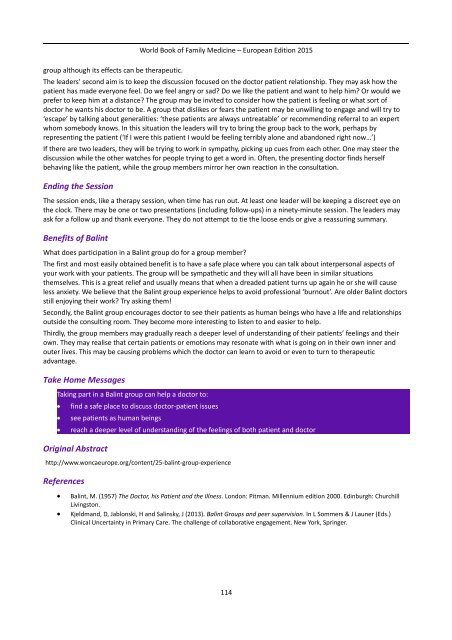Family Medicine
World Book 2015
World Book 2015
You also want an ePaper? Increase the reach of your titles
YUMPU automatically turns print PDFs into web optimized ePapers that Google loves.
group although its effects can be therapeutic.<br />
World Book of <strong>Family</strong> <strong>Medicine</strong> – European Edition 2015<br />
The leaders’ second aim is to keep the discussion focused on the doctor patient relationship. They may ask how the<br />
patient has made everyone feel. Do we feel angry or sad? Do we like the patient and want to help him? Or would we<br />
prefer to keep him at a distance? The group may be invited to consider how the patient is feeling or what sort of<br />
doctor he wants his doctor to be. A group that dislikes or fears the patient may be unwilling to engage and will try to<br />
‘escape’ by talking about generalities: ‘these patients are always untreatable’ or recommending referral to an expert<br />
whom somebody knows. In this situation the leaders will try to bring the group back to the work, perhaps by<br />
representing the patient (‘If I were this patient I would be feeling terribly alone and abandoned right now…’)<br />
If there are two leaders, they will be trying to work in sympathy, picking up cues from each other. One may steer the<br />
discussion while the other watches for people trying to get a word in. Often, the presenting doctor finds herself<br />
behaving like the patient, while the group members mirror her own reaction in the consultation.<br />
Ending the Session<br />
The session ends, like a therapy session, when time has run out. At least one leader will be keeping a discreet eye on<br />
the clock. There may be one or two presentations (including follow-ups) in a ninety-minute session. The leaders may<br />
ask for a follow up and thank everyone. They do not attempt to tie the loose ends or give a reassuring summary.<br />
Benefits of Balint<br />
What does participation in a Balint group do for a group member?<br />
The first and most easily obtained benefit is to have a safe place where you can talk about interpersonal aspects of<br />
your work with your patients. The group will be sympathetic and they will all have been in similar situations<br />
themselves. This is a great relief and usually means that when a dreaded patient turns up again he or she will cause<br />
less anxiety. We believe that the Balint group experience helps to avoid professional ‘burnout’. Are older Balint doctors<br />
still enjoying their work? Try asking them!<br />
Secondly, the Balint group encourages doctor to see their patients as human beings who have a life and relationships<br />
outside the consulting room. They become more interesting to listen to and easier to help.<br />
Thirdly, the group members may gradually reach a deeper level of understanding of their patients’ feelings and their<br />
own. They may realise that certain patients or emotions may resonate with what is going on in their own inner and<br />
outer lives. This may be causing problems which the doctor can learn to avoid or even to turn to therapeutic<br />
advantage.<br />
Take Home Messages<br />
Taking part in a Balint group can help a doctor to:<br />
<br />
<br />
<br />
find a safe place to discuss doctor-patient issues<br />
see patients as human beings<br />
reach a deeper level of understanding of the feelings of both patient and doctor<br />
Original Abstract<br />
http://www.woncaeurope.org/content/25-balint-group-experience<br />
References<br />
<br />
<br />
Balint, M. (1957) The Doctor, his Patient and the Illness. London: Pitman. Millennium edition 2000. Edinburgh: Churchill<br />
Livingston.<br />
Kjeldmand, D, Jablonski, H and Salinsky, J (2013). Balint Groups and peer supervision. In L Sommers & J Launer (Eds.)<br />
Clinical Uncertainty in Primary Care. The challenge of collaborative engagement. New York, Springer.<br />
114


